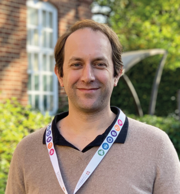Events
Dec 19, 2023
Seminar (2023-12-19)
School of Biomedical Sciences is pleased to invite you to join the following seminar:
Date: 19 December 2023 (Tuesday)
Time: 4:00 pm – 5:00 pm
Venue: Lecture Theatre 1, G/F, William M.W. Mong Block, 21 Sassoon Road
Speaker: Dr. Brian Ferguson, Associate Professor of Immunology, Department of Pathology, University of Cambridge
Talk Title: Can we code viruses to cure cancer?
Biography

Brian Ferguson is Associate Professor of Immunology at the University of Cambridge where his lab uses viruses to both understand and modulate our immune system. The Ferguson-lab’s expertise in viral immunology and host responses resulted in the discovery of a new pattern recognition receptor, novel cell death pathways and multiple mechanisms of viral immune evasion. More recently, leveraging the knowledge gained by the lab’s research into fundamental science of host/pathogen interactions has led to the generation of novel vaccine vectors and the development of next generation oncolytic poxviruses. Working in a teaching department, Brian runs an immunology course and manages a masters course in infection and immunity, as well as developing and running undergraduate practical classes and lecturing in host/pathogen interactions and vaccinology.
Abstract
Oncolytic viruses (OVs) are gaining clinical traction as cancer therapeutics because of their ability to clear tumours and generate robust, durable anti-tumour immunity. Poxviruses are excellent candidate OVs as they can directly lyse infected cells and trigger long-lasting immune responses. The prototypical poxvirus, Vaccinia virus, is among the best infectious disease vaccines to have been developed, and was used to eradicate smallpox. In this talk I will present data showing how it is possible to make rational modifications to Vaccinia virus in order to develop it into a next generation oncolytic virus. We have uncovered multiple mechanisms by which vaccinia virus supresses innate immunity, particularly by defining how it blocks pattern recognition receptor signalling. Leveraging this knowledge we are engineering viruses with modified viral genomes that activate specific and appropriate innate immune responses in tumours that lead directly to the activation of CD8 T cell responses. These flexible candidates vaccines can be further modified to target specific tumours and promote T cell infiltration and hence have great potential for further development.
ALL ARE WELCOME
Should you have any enquiries, please feel free to contact Miss Angela Wong at 3917 9216.

